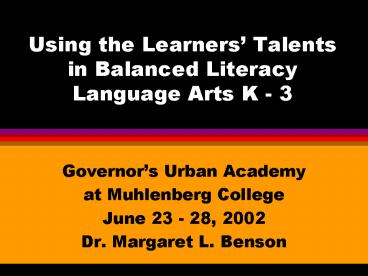Using the Learners PowerPoint PPT Presentation
1 / 23
Title: Using the Learners
1
Using the Learners Talentsin Balanced
LiteracyLanguage Arts K - 3
- Governors Urban Academy
- at Muhlenberg College
- June 23 - 28, 2002
- Dr. Margaret L. Benson
2
The Pennsylvania Standards
- 1.2 Reading Critically in All Content Areas
- 1.3 Reading, Analyzing and Interpreting
Literature - 1.5 Quality of Writing
- 1.8 Research
3
Traditional View ofIntelligence
- Verbal-Linguistic Math-Logical
- Binet-Simon Intelligence Scale
- Stanford-Binet Intelligence Test
- mental age/chron. Age
- times 100
- WISC
4
Multiple IntelligencesHoward Gardner
- Brain research
- Theory in progress
- Frames of the Mind (1983)
- Probe beyond the traditional
5
What Type of Learner Are You?
- As a child
- Favorites outside school
- Favorite subject in school
- Favorite teacher - because
- You were intelligent in _____
- School would have been better if __________
- You decided you wanted to be a teacher because
_______
6
Eight Ways of Being Smart
- Verbal-Linguistic
- Math-Logical
- Spatial
- Bodily-Kinesthetic
- Musical
- Interpersonal
- Intrapersonal
- Naturalist
7
Spatial
- Strong in
- maps, puzzles
- Likes to
- design, create, looks at pictures
- Learns best through
- visualizing
- Famous examples
- Pablo Picasso
- Frank Lloyd Wright
8
Bodily-Kinesthetic
- Strong in
- acting,
- Likes to
- move around, touch and feel
- Learns best through
- touching, processing through senses
- Famous examples
- Charlie Chaplin
- Martina Navratilova
9
Musical
- Strong in
- singing, rhythms
- Likes to
- sing, hum, listen to music
- Learns best through
- rhythm, melody
- Famous examples
- Leonard Bernstein
- Ella Fitzgerald
10
Intrapersonal
- Strong in
- understanding self, setting goals
- Likes to
- work alone, reflect
- Learns best through
- doing self-paced projects
- having own space
- Famous examples
- Eleanor Roosevelt
- Sigmund Freud
11
Using the Learners Talents
- Pennsylvania Standards
- Multiple Intelligences
- Balanced Literacy
12
Balanced LiteracySix Aspects
- Ownership of Literacy
- Reading Comp. Writing Process
- (Readers Workshop) (Writers Workshop)
- Language and Vocabulary Knowledge
- Word Reading and Spelling Strategies
- Voluntary Reading
- (Au, Carroll, Scheu, p. 4)
13
Balanced Literacy
- Six Aspects of Literacy
- Full process
- Authentic context
- Reading and writing
- Speaking and listening
- Community of learners
14
Balanced Literacy
- Positive Attitudes towards Literacy
- Part of their daily routine
- Affective side as important as cognitive
- Accomplishment of real-world tasks
- The will as well as the skill
- Responsibility for their own learning
- Control over their lives in school
- Teachers responsibility to guide
15
Balanced Literacy
- Reader Response Theory
- Louise Rosenblatt
- Transaction between reader and text
- Aesthetic
- reading for the sake of reading
- attention on what she/he is living while reading
- Efferent
- what should be retained
16
Balanced Literacy
- Lev Vygotsky
- Guided and paced by a more capable person (Zone
of Proximal Development - ZPD) - Enable the child to actively participate
- Support from someone who knows the child
17
Balanced Literacy
- Practical Implications
- Use heterogeneous grouping
- Give students choices of the texts they will read
and discuss - Base discussions on students responses to the
text, not preset teacher questions - Take the role of a facilitator rather than
question-asker
18
Balanced Literacy
- Writing
- Construct meaning
- Communicate a message
- Choose self-selected topics
- See themselves as authors
- Dynamic, nonlinear process
19
Balanced Literacy
- Writing
- Shared Writing
- Interactive Writing
- Guided Writing
- Independent Writing
20
Balanced Literacy
- Writing Process
- Planning
- Drafting
- Revising
- Editing
- Publishing
21
Balanced Literacy
- Reading
- Read-Aloud
- Guided Reading
- Shared Reading
- Independent Reading
22
Balanced Literacy
- Continuum of Reading Strategies
- Teacher Read Alouds
- Sustained Silent Reading
- Literature Discussion Groups
- Guided Discussion
- Guided Reading
- Shared Reading
- K 1 2 3 4 5 6
- (Au, Carrol, Scheu, p. 79)
23
Balanced Literacy
- Writing
- Shared Writing
- Interactive Writing
- Guided Writing
- Independent Writing
- Reading
- Read-Aloud
- Guided Reading
- Shared Reading
- Independent Reading

